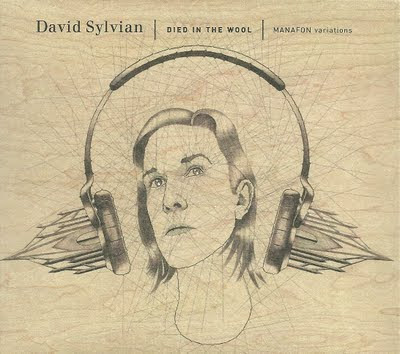

Listening to David Sylvian's post-millennium albums (save for Nine Horses, which was indisputably a crowd pleaser), you're just confronted with the darkest, dreariest side of the human mind. Most of the music is acapella and it has the sense to it that it was conceived by a man in total seclusion, just pondering away at his thoughts for hours in a starkly lit room over several cups of decaffeinated tea. Yeah: not tons of fun, but grounds for some serious soul discovering.
I kept my thoughts on the initial Manafon album brief because I found it a very difficult album to listen to. Truth be told, I've not gone back to it much since my initial few run-throughs. If the man has a knack for something, it's making his audience uncomfortable. But it's not in that Miles Davis way where I don't want to hear his next move. I just don't want to be able to relate to it as much as he is able to make me.
Make no mistakes, Died in the Wool is not a remix album in the same sense that The Good Son vs. The Only Daughter was. Where that album had guests take on the task of basically making the songs fully arranged with complete band backing tracks, Died in the Wool just simply makes the already sparse arrangements a bit more orchestral. Consequently, not as sparse, but not necessarily as immediately as accessible either. Indeed, most of the songs rely on a very post-modern classical ideal. The strings are atonal and unpredictable. Dissonantly beautiful one second, bleak and menacing the next, with accents of woodwinds and David's voice as the articulate centerpiece, Died in the Wool isn't so much a remixing job as it is a revision.
There are reused vocal tracks with new arrangements (and different titles) and some things that are just plain old brand new. If you picked up the odds and ends collection Sleepwalkers, you were treated to a couple of Manafon-period outtakes that, along with the proper album and this new revised version, make for the ultimate deluxe downer edition of the album.
As the music stands, I actually find this version the most listenable, as the string accompaniments are able to fill the space, but not clutter the dynamics. In the case of some songs —most namely, the title track— I would say that this version is an improvement. However, as such sparse music demands total attention on all of the elements, the vocals inevitably take the spotlight. David is bummed. He has been for a while. And yet, even when treading familiar water, he still finds ways to be poignant and articulate as few vocalists are able to be in contemporary times. I just wish he could look at the bright side more often (take, for instance, 'Small Metal Gods,' the one time that he does, and it's clearly the highlight of both versions of Manafon).
It's not until the all new, eighteen minute track 'When We Return You Won't Recognise Us' that it may occur to the listener that David Sylvian's music sounds like no one else' output, past or current. He is blazing trails into territory only hinted at by others. I often hear this music and think that while other combos are using a hybrid of instrumental prog and post-shoegaze sounds, David Sylvian is actually creating a music that is post-modern in its rock and roll singer pretenses. Blending atonal post-modern classical, hints of free jazz, glitchy post-production and a good old fashioned confessional singer/songwriter narrative, I think of his current output in the most literal interpretation of "post-rock" music.
I just wish he would tour America. Dammit.
~Austin

No comments:
Post a Comment